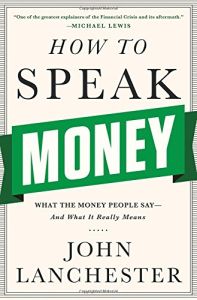Join getAbstract to access the summary!

Join getAbstract to access the summary!
John Lanchester
How to Speak Money
What the Money People Say – and What It Really Means
W.W. Norton, 2014
What's inside?
Money has enormous effects on your life. Can you speak its language?
Recommendation
Writer John Lanchester makes a stark point when he conjures the image that a widespread sewer disaster might compel members of the general public to learn plumbing jargon. The same imperative applies to the language of finance following the 2008 system breakdown. Generally, the authors of dictionaries go to great lengths to create word definitions that are precise and neutral in meaning. In contrast, Lanchester offers a primer on economic thinking, along with a broad lexicon that includes the specific meanings of technical terms and translations of often-used idioms that can baffle even the most literate nonspecialists. From the very start, he is open about his own biases, but he nonetheless provides informative explanations of esoteric terms and perplexing figures of speech. getAbstract recommends this resource, which covers more than 300 terms, to anyone who deals with money and especially to newcomers to finance and economics.
Summary
About the Author
John Lanchester is the author of the best-selling exposé of the 2008 financial crisis, I.O.U.: Why Everyone Owes Everyone and No One Can Pay. He also is a fiction writer and contributor to The London Review of Books and The New York Times, among other media outlets.


















Comment on this summary